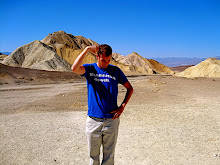
Plaza in Rabat, Morocco
That being said...Moroccans are BRUTAL. They are absolutely the worst people I've ever had to deal with in my entire travelling history, and almost enough to warrant ruining the trip. I apologize if you are reading this and Moroccan. Many of my everyday interactions with taxi drivers and street vendors ended in a lot of shouting and anger. Morocco seems to be one of those countries that is so overexposed to tourism that all of the inhabitants are used to haggling and annoying everyone who comes near them that might have a cent of money in their pocket. Most taxi drivers will chase you down the street for a fare, and if they are lucky enough to get you in the cab..attempt to charge you between 5x and 10x the normal rate for that trip. When you refuse, they argue with you like you are crazy. The idea of someone in Morocco helping you with a direction or simple answer to a questions is a ridiculous laughing matter.
"Excuse me, is ___ street this way or this way?"
"This way into my shop, I give you good price, cmon"
"Do you know where the bus station is?"
"There is no bus, but I can take you in my taxi.."
"Oh, I see it right across the street, thank you for being so helpful!"
This obviously isn't new to any foreign traveller but after a couple weeks it can start to drive you literally insane...

Rabat, Morocco
Morocco is located on the western side of North Africa, with Spain to its North and Algeria, Tunisia on the East. It is an important immigration hub for North Africans to migrate into Spain and Europe through the port town of Tangiers. Tangiers has long been famous for it's refuge to many cultural diversities. It was long an espionage center during the Cold War and a famous artist's enclave in the mid 20th century for the likes of William S. Burroughs, Henri Matisse and Jack Kerouac, who all drew inspiration from the uniqueness of the city.

King Hassan II Mosque
Further down the coast, the cities of Rabat and Casablanca (only an hour apart) are the financial and commercial capitals of the country. Casablanca is obviously famous for..well..Casablanca, "Here's looking at you kid." There is even a replica Rick's Cafe located near the medina (where I ate dinner and bought a t-shirt since I'm a good American.) Both of these cities are a bit rundown, however Casablanca owns the third largest moqsue in the world, the Hassan II. This is one of the only mosques in the world non-muslims can enter and I was lucky enough to latch onto a 1 hour tour of the place. Quite impressive!

Hassan II Mosque
The best part about the visit to Morocco was the mountain town of Chefchaouen. After riding a few different methods of transportation (bus, train, grand taxi) we reached this beautiful village perched above the Rif Mountains. There is a picturesque medina, set against the dramatic backdrop of the mountains. It is filled with white-washed homes with distinctive powder-blue accents. The call to prayer rings out here through several mosques during the day in chorus, and is quite peaceful. This area is really well-known for its huge production of marijuana and hashish, which supplies 80% of Morocco. My co-worker and I went for a day hike up into the mountains and just walked by acres upon acre of marijuana plantations. Many farmers and women were chugging along, doing their business and friendly enough for a wave or a picture.

Chefchaouen, Morocco

Medina in Chefchaouen, Morocco
Morocco has come a long way in the past 10 years. Their king, Hassan II, was a traditonal older man, who kept the country as a strict, muslim state. When he passed in 1999, his son, Mohammed VI took power and with him came a much more liberal approach to running the country. He quickly passed laws granting women the power to vote, attend school, etc. There are many more bars, and drinking and nightlife have begun to flourish, with the help of a strong tourism industry. Now, Morocco feels more a bit more like a European country than it's neighbors Algeria and certainly Libya.
Speaking of Libya..next stop! Should have a good post from there soon.











